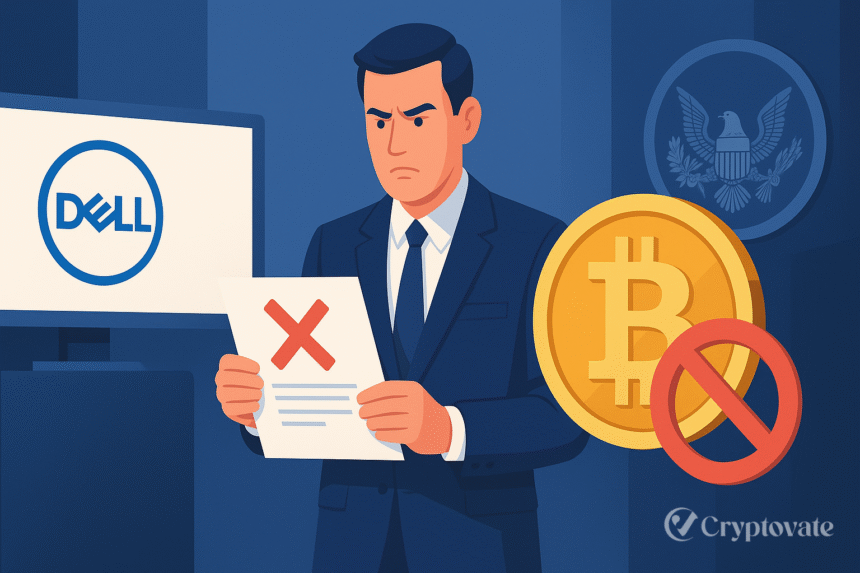– Ad –
| Getting your Trinity Audio player ready... |
In a recent development, Dell Technologies, a global leader in technology solutions, has rejected a shareholder proposal to incorporate Bitcoin into its treasury reserves. The decision, supported by the U.S. Securities and Exchange Commission (SEC), highlights Dell’s cautious approach to cryptocurrency amid growing interest in Bitcoin as a corporate asset. Here’s a closer look at why Dell opted against this move and what it means for the broader crypto landscape.
The Proposal: Bitcoin as a Treasury Asset
The proposal, submitted by the National Center for Public Policy Research (NCPPR), urged Dell to evaluate Bitcoin as a treasury reserve asset to hedge against inflation. Citing Bitcoin’s fixed supply of 21 million coins and its growing institutional adoption, NCPPR argued that holding Bitcoin could protect Dell’s $5.83 billion cash reserves from losing value due to inflation and low bond yields. The think tank pointed to BlackRock’s recommendation of a 2% Bitcoin allocation and MicroStrategy’s success with its Bitcoin-heavy treasury strategy as key inspirations.
The proposal also referenced Dell’s historical openness to cryptocurrency, including its brief acceptance of Bitcoin payments in 2014 through a partnership with Coinbase. Additionally, CEO Michael Dell’s 2024 tweet featuring a Bitcoin meme and the phrase “scarcity creates value” had sparked speculation about the company’s interest in crypto. Despite these factors, Dell’s management firmly declined the proposal.
Why Dell Said No
Dell’s rejection, formalized on May 8, 2025, was grounded in its commitment to management autonomy over financial strategy. The company argued that decisions about cash and investment strategies are complex and best left to its leadership, not shareholders. Through its legal team at Hogan Lovells, Dell filed a no-action request with the SEC, asserting that the proposal constituted “improper micromanagement” of its financial operations. The SEC agreed, granting Dell permission to exclude the proposal from its 2025 shareholder meeting, reinforcing that treasury decisions should remain with management. Read the SEC’s letter here.
Dell’s stance reflects a broader trend among traditional corporations prioritizing stability over speculative assets like Bitcoin. While the crypto market has seen a bullish surge, with Bitcoin nearing $105,000 in May 2025, Dell emphasized the need for flexibility in managing its $66 billion market cap. The company’s leadership believes that enforcing specific investments like Bitcoin could limit its ability to adapt to market conditions.
Also Read: AML Rules Crypto Transactions: EU’s New Push to Track All Transfers
The Bigger Picture: Crypto in Corporate Treasuries
Dell’s decision comes at a time when Bitcoin adoption is gaining traction among corporations. Companies like MicroStrategy have embraced Bitcoin as a core treasury asset, while others, including Meta and Amazon, have faced similar shareholder proposals from NCPPR. Microsoft, for instance, allowed a Bitcoin proposal to reach a shareholder vote in 2024, though it was ultimately rejected. These developments highlight the ongoing debate about whether cryptocurrencies belong in corporate balance sheets.
Critics of Dell’s decision, including some shareholders, argue that the company may be missing out on Bitcoin’s potential as an inflation hedge. Posts on X reflect mixed sentiment, with some users calling Dell’s rejection a missed opportunity for innovation, while others view it as a prudent move to avoid crypto’s volatility.
What’s Next for Dell and Bitcoin?
For now, Dell remains focused on its core business, particularly its AI-driven server and networking segments, which have driven a 9% revenue increase in 2024. While Michael Dell’s social media activity suggests personal interest in Bitcoin, the company has made it clear that it won’t adopt cryptocurrency in its treasury anytime soon. As Bitcoin grows in mainstream popularity, Dell’s conservative stance highlights the gap between major tech companies and the cryptocurrency movement.
This decision may not close the door on future crypto exploration, but it signals that Dell prioritizes financial independence over speculative investments. For crypto enthusiasts, the focus now shifts to other corporations that may embrace Bitcoin, potentially reshaping the corporate treasury landscape.
FAQs
Why did Dell Technologies decline the proposal to add Bitcoin to its treasury reserves?
Dell Technologies declined the shareholder proposal from the National Center for Public Policy Research (NCPPR) to incorporate Bitcoin into its treasury, citing that financial strategy decisions, such as cash and investment management, are complex and best handled by its leadership team. The company argued that mandating a specific asset like Bitcoin could restrict its flexibility to adapt to changing market conditions. The U.S. Securities and Exchange Commission (SEC) supported Dell’s stance, allowing the company to exclude the proposal from its 2025 shareholder meeting due to it being considered “improper micromanagement.”
What was the basis of the shareholder proposal for Bitcoin adoption?
The proposal from NCPPR encouraged Dell to adopt Bitcoin as a treasury asset to protect against inflation. It highlighted Bitcoin’s fixed supply of 21 million coins, its growing institutional adoption, and examples like BlackRock’s 2% Bitcoin allocation recommendation and MicroStrategy’s successful Bitcoin-heavy treasury strategy. The proposal also referenced Dell’s brief acceptance of Bitcoin payments in 2014 and CEO Michael Dell’s 2024 tweet suggesting interest in crypto’s value proposition.
Could Dell reconsider Bitcoin in the future?
While Dell’s current stance prioritizes management autonomy and financial flexibility over adopting Bitcoin, the company’s leadership, including CEO Michael Dell, has shown some personal interest in cryptocurrency. However, there’s no indication of immediate plans to revisit the decision. As Bitcoin gains traction among corporations, future shareholder pressure or market shifts could prompt Dell to reevaluate its position, though no such commitment has been made.

















